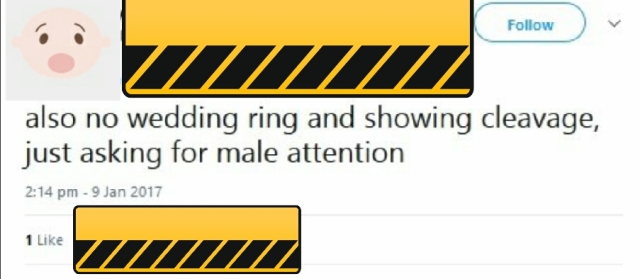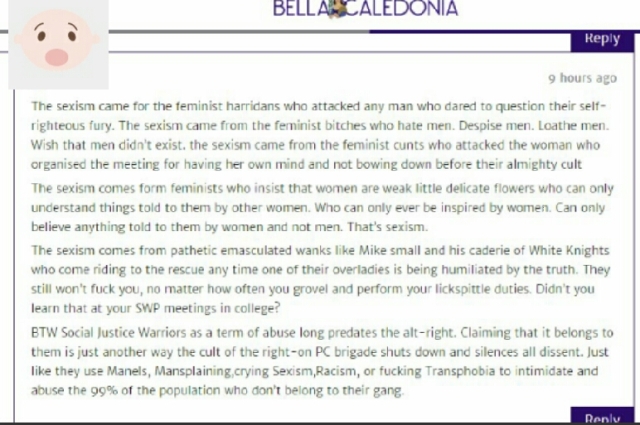
“It is incumbent upon each of us to be the woman that [killer’s name] wanted to kill. We must live with this honor, this courage. We must drive out fear. We must hold on. We must create. We must resist. Andrea Dworkin (2007)
Online, in an increasingly polarised section of the internet called “the Yes Movement” (nationalists versus progressives/lefties etc… ) Men, and women, just a fortnight before the eighteenth anniversary a hate crime that shocked the world, were defending the strange position that Scotland does not suffer from sexism. In fact, some people outwardly stated that “gender was not a problem,” and that the feminists were going too far in asking for gender balanced panels at meetings.




On December 6th 1989, a man decided that affirmative action (positive discrimination) in École Polytechnique in Montreal (a university in the city), was keeping him back in life. He walked into an engineering class, where he lined up all of the women students and shot them, shouting, “I hate feminists…”
The fourteen murdered women were Geneviève Bergeron, Hélène Colgan, Nathalie Croteau, Barbara Daigneault, Anne-Marie Edward, Maud Haviernick, Barbara Klucznik Widajewicz, Maryse Laganière, Maryse Leclair, Anne-Marie Lemay, Sonia Pelletier, Michèle Richard, Annie St-Arneault, and Annie Turcotte.
The murderer’s name doesn’t matter. In fact I won’t be mentioning his name in this article.
In all we do to remember the injustices against women, be they small as exemplified in the online #everydaysexism hashtag, or in this terrible event and in the dreadful statistics that show our society has a problem with violence against women, we must remember these women had their lives cut short by a man who blamed them for his perceived loss of privilege.
Many people came into the Scottish twitter spat, #manelgate, saying they hated feminists (regardless of the adjective they used before the word),or saying they weren’t feminists, and they “saw men and women as equals.” One of the panellists went as far as to say that people who were highlighting this issue were attacking him as a man.




The chilling thing about this Twitter “conversation” this week, is that it mirrors debate and discussion in civic life in Canada before and after the awful event in Montreal.
On the lead up to that event, there had been an increasing reaction from some men on the legislative moves towards equality. “Men’s rights” groups were springing up, as the campaign to give women equal rights and opportunities in society was in its infancy.
The killer’s suicide note, which in the weeks after the massacre had been withheld by Montreal police, was chilling.
“Would you note that if I commit suicide today it is not for economic reasons … but for political reasons,” it read. “Because I have decided to send the feminists, who have always ruined my life, to their Maker … I have decided to put an end to those viragos.”
He listed all of the aspects of life he thought women had taken advantage over him and other men.
In sum, the killer held feminists responsible for all of his personal problems, and had also made a list of women to be shot, including politicians and business women.
Some “intellectuals” and public discourse after the event, blamed the perceived victory of feminism as the cause. And the word “veragos,” a word that had become prevalent in the discourse before the shooting, was used on occasions during debates in Canada about interventions in cases of domestic violence.
One of the masculinist rhetorical strategies to absolve the responsibility of the massacre from the killer to feminism, was to talk about a “feminist plot,” there are many examples of this across the internet (I recommend the research of Mélissa Blais), but one chilling quote from a piece by a Masculinist, Francois Brooks (1999) entitled “[Killers name] et les feministes,” says,
“On December 6, 1989, there were in fact 15 victims shot down by an insane idea introduced by an outrageous feminism. The idea that men are executioners and women the victims must be eliminated. What’s needed is love, simply love. It would have taken women to love [killer’s surname], to save him and the fourteen others from the murderous idea engendered by the feminists.”
It was, according to Brooks and others, women’s fault for not loving the killer that the killer murdered women.
We saw the same again in 2014, when a 22year old man killed 6 people and wounded 14 others, in Isla Vista, California. Again, we don’t need to state his name. He left a 100,000 word manifesto and a youtube video explaining his motivations, explaining that he wanted to punish women for rejecting him and that he envied sexually active men so he wanted to punish them for their sexual activity. He stated in his manifesto that in his self-proclaimed ideal world, he imagined that he would;
“quarantine all [women] in concentration camps. At these camps, the vast majority of the female population will be deliberately starved to death.”
Once again commentators speculated that had more women loved him, been more friendly to him, given him the attention he wanted, he would not have committed his crime. When feminists and journalists tried to frame the motivations of the killer against a backdrop of a patriarchal society that tries to rob women of agency while shaming men who do the meet up with a stereotypical masculine ideal, they were shouted down on the basis that the killer murdered men too, and had mental health issues. The hashtag #NotAllMen was born.
Masculinism and meninism claims that there is a feminist conspiracy – feminists are hijacking their lives and organisations. And this discourse happened in Canada AFTER 14 women died at the hands of a masculinist. And happened once again AFTER a meninist had expressly stated that his reasons for going on a killing spree were that he didn’t feel women were giving him what he was entitled to.
Psychologist, Patrizia Romito arrives at the following definition of the ideology implicit in blaming the victims and the whitewashing of male violence and misogyny;
“[A] set of concepts and beliefs grounded on a distortion of reality and conceived, sometimes unconsciously, for the sole purpose of protecting the interests of the dominant group, in this case, the perpetrators of violence.” Furthermore, she writes, “to protect these interests, blaming the victims may turn out to be insufficient; in some cases punishment must be dealt out.”
The killers have been heroized by masculinist groups and individuals. Heroizing takes three main stages, “first to be known and accepted, any hero must carry out actions.” Second he must be officially confirmed, whether by a government, a group of admirers, or a population. Finally, “he must be institutionalized, that is given institutional status to ensure his immortality.”(Julie Perone 2007).
The Montreal massacre is well known, and is commemorated every year in a series of events across Canada and indeed the world. And there has been attempts by men in articles and in ceremony, to legitimise and celebrate what he did as “understandable,” and a tactic worthy in a perceived fight against feminism. The killer has in turn been excused by pseudo psychologists and the press in Canada, almost, in some masculinists eyes, taking on the mantel of a martyred hero for the cause.
Nicole Brossard, a writer, stated,
“Reading La Presse and Le Devoir, … I have wondered if [killer’s name] will soon have received more sympathy than his dead and injured victims.”
Micheline Carrier (2002) says,
“Each week, women are murdered for motives similar to those of [killer’s name], that is, the inability to let women determine their own lives and become full members of society… The “fathers lobby” downplays domestic violence and, ignoring reliable data, claims that the violence of women against men is equal to if not greater than the violence of men against women. Some men believe that recognition of a right for women results in the loss of rights for them. These people demand legislative changes that would limit the rights of women and endanger women and children living in a violent environment.”
I am not suggesting there is a masculinist/meninist in Scottish society who is about to kill women because of Yes groups being called out for the gender inequality that seems to be prevalent in the groups and their public meetings, but I am suggesting some men need to look at the language they used during that discourse, and how easily some played the victim card, and were in turn given sympathy.


 Our words have power, perhaps greater power than we mean them to, and we should be mindful of how that power is directed.
Our words have power, perhaps greater power than we mean them to, and we should be mindful of how that power is directed.
A society that has 51% women can no longer make excuses as to why women are excluded from political and other civic discourse. We need to be looking for solutions. Some of these crowdfunding, victim blaming speakers would do well in standing aside or refusing to sit on a platform that is at the very least, not gender balanced. Society is skewed, violently, in favour of men in many ways (WASPI women being one of the latest to hit the headlines, the disproportionate effect of Universal Credit sanctions on pregnant women another).
Women’s voices need to be heard, promoted and normalised as part of public discourse and women need to feel safe and confident they will be heard, not demonised, or worse for speaking out and taking their rightful place in a society that has a long way to go to be equal. We can do better than this. We should be doing better than this.
If this has led you to reflect on what you could be doing better, or just inspired you to do more to stand against misogyny and violence against women, we’d encourage you to look up the White Ribbon Campaign which was set up in response to the Montreal massacre, who aim to address men directly – so they understand the scale of the problem, and become part of the solution, alongside women.




Great article but could you rethink this clause in your first sentence? “(nationalists versus progressives/lefties etc… ).” I am not sharing your article because of this language. “Nationalists” is a dirty word, and if you are trying to persuade and influence people, insulting those of your potential readers by “othering” them in your first sentence isn’t the way to go.